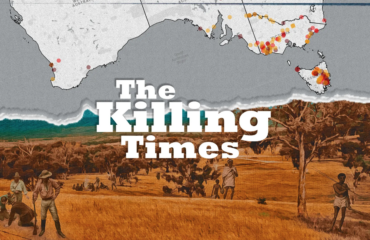Food banks in Victoria’s Macedon Ranges are facing unprecedented demand for their volunteer-run services as the cost-of-living crisis worsens.
The Kindness Collective, a not-for-profit volunteer-run organisation in Kyneton, is one of several community-run services in the region distributing donated food to those in need.
Operations manager, Kerryn Wildenburg, said demand for its services, particularly its food bank and soup kitchen, had increased 35 per cent in the past financial year.

Demand continues to grow amid rising cost of living pressures at the Kindness Collective, says manager Kerryn Wildenburg (pictured right, with volunteer Michelle). Photo: Sam Irvine
“At different times over the last few years we’ve seen demand for services fluctuate, but in the past 12 months we’ve seen a consistent increase in demand,” said Wildenburg.
Demand is being driven by rising bills and supermarket prices, alongside skyrocketing mortgage repayments and rents linked to the Reserve Bank’s interest rate hikes. Wildenburg said something as small as a rise in the cost of milk was enough to see people end up at their food bank.
“For those on government support with a set budget, it’s a lot to absorb,” she said.
But the impact is also being felt more broadly, with Wildenburg saying the demographics of people visiting The Kindness Collective were shifting.
“We’re seeing people come here now who never came here before.”
“Typically, it was singles and the elderly, but now we’re seeing a lot of single parent families and a lot of young students,” she said.
Dependent entirely on their local communities for volunteers and donations, Wildenburg said the growing demand meant the organisation couldn’t afford to wait around for government assistance but instead focused efforts on expanding the network of local not-for-profits to meet the impacts of rising demand.
“When I started [as operations manager] six years ago, we were the only food bank in the Macedon Ranges, now there’s five,” she said.
In addition to the Kindness Collectives service, established in 2013, the Macedon Ranges also has food banks in Gisborne, Romsey, Trentham, Lancefield and Woodend.

Students and single parent families are joining the elderly in needing food relief. Photo: Shutterstock
Volunteering Victoria’s CEO, Thu Trang Tran, said the rise in demand at the same time costs of living bites were spiking meant that volunteer-led organisations across regional Victoria were facing increasingly difficult circumstances.
“Services are isolated, volunteers and staff are overstretched and fatigued, and access to funds and resources are declining,” she said.
According to the Australian Bureau of Statistics, national volunteer rates are 19 per cent lower than pre-pandemic levels.
In a statement, Federal Minister for Social Services, Amanda Rishworth, said the government understood people were doing it tough, and the recent May budget had provided “responsible, targeted cost-of-living relief” to help remedy this.
“Since the beginning of the year an additional $15.7 million in economic crisis funding has been provided to Emergency and Food Relief providers.
“In November last year, the government announced an extension of funding of $190 million over two years for Emergency Relief, Food Relief and Financial Counselling,” the statement said.
Rishworth said the funding would provide certainty to over 190 individual community organisations that were under increasing pressure.
Lyn Margaret, manager of the nearby Gisborne Foodbank, said it too had experienced the same 35 per cent increase in demand over the past year, but widespread community engagement, rather than government support measures, was helping to keep the organisation ahead of demand.

The sense of community is strong at the Gisborne Foodbank, says manager Lyn Margaret. Photo: Sam Irvine
“We have a lot of generous people within the community whose donations are helping us keep up with demand, so far.”
Margaret said maintaining a spirit of optimism within the community and the organisation was helping to retain volunteers.
“We keep a very positive atmosphere, and in turn it’s a positive place to volunteer,” she said.
An earlier version of this article was published in the Midland Express.



